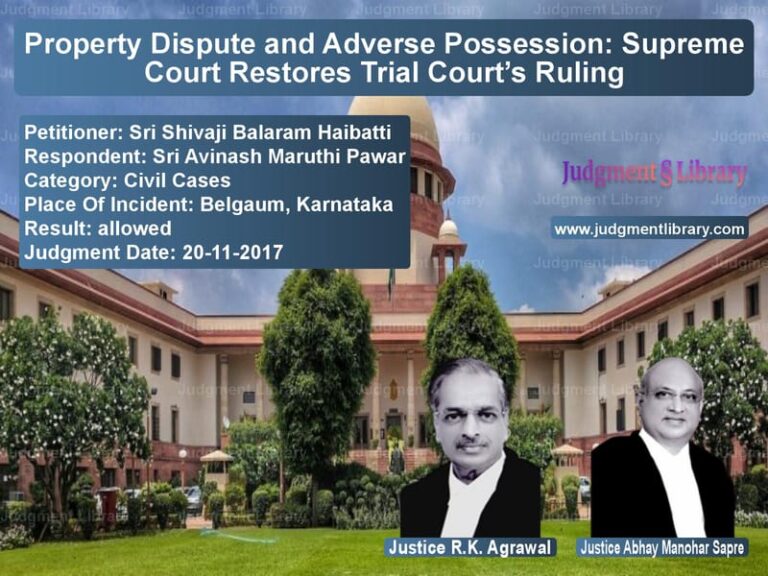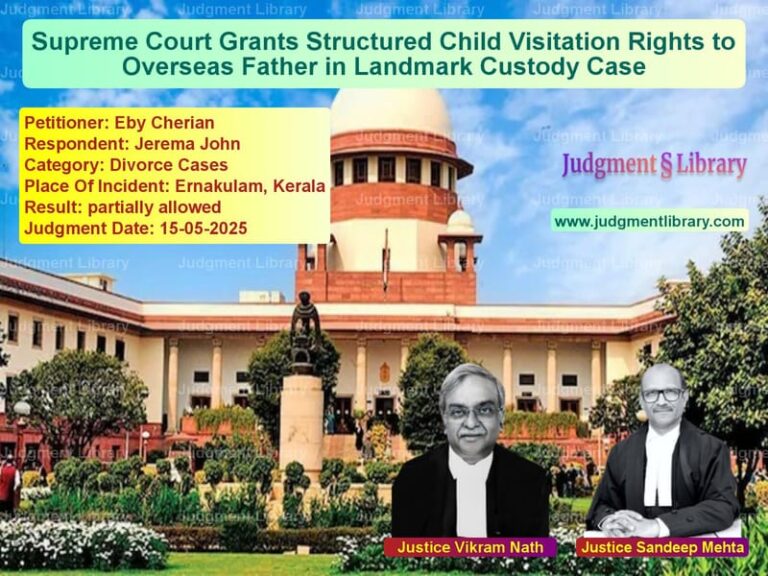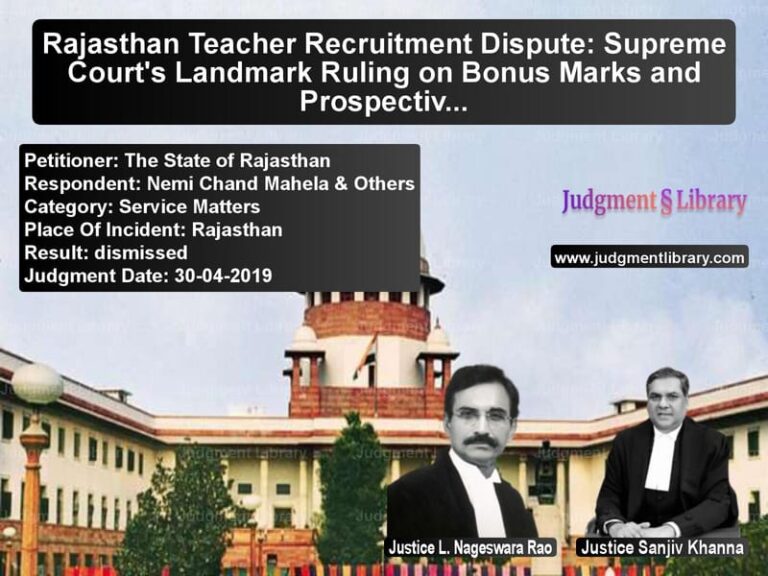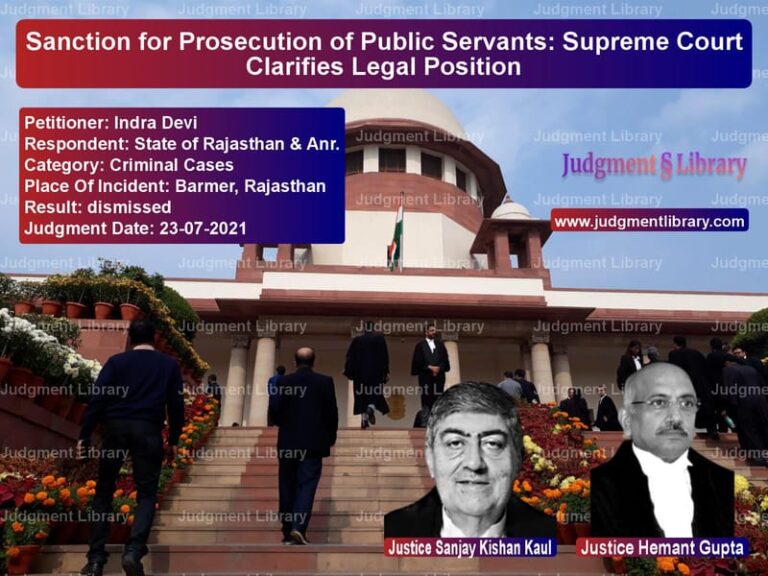Uttar Pradesh ITI Instructor Recruitment: Supreme Court Upholds Equivalence of Modular Training Certificate
The case of Rajesh Kumar Dwivedi vs. State of U.P. & Anr. is a significant Supreme Court judgment concerning the eligibility criteria for recruitment of instructors in Industrial Training Institutes (ITI) in Uttar Pradesh. The Supreme Court ruled in favor of the appellant, holding that his modular training qualifications should be considered equivalent to the required National Trade Certificate (NTC) for the post of Instructor.
Background of the Case
The Directorate of Training and Employment, Uttar Pradesh, issued an advertisement on March 17, 2008, inviting applications for Instructor positions in government ITIs. The eligibility criteria required candidates to possess:
- A certificate in the relevant trade from the National Council of Vocational Training (NCVT).
- Two years of work experience in any industry or educational institute.
The appellant, Rajesh Kumar Dwivedi, applied for the post of Instructor (Fitter Trade). His qualifications included:
- One-year basic training in the Mechanical Group from Model Industrial Training Institute (MITI), Haldwani.
- Six-month training in Fitter General from MITI, Haldwani.
- Six-month training in Metrology and Engineering Inspection from MITI, Haldwani.
The authorities rejected his application, stating that he did not possess a two-year NTC from NCVT. His petition was dismissed by the Allahabad High Court, leading to an appeal in the Supreme Court.
Key Issues in the Case
The Supreme Court examined the following key issues:
- Whether the modular training certificates obtained by the appellant were equivalent to the two-year NTC.
- Whether the Uttar Pradesh Government’s previous circulars recognized modular training as equivalent.
- Whether the rejection of the appellant’s candidature was legally justified.
Arguments by the Appellant (Rajesh Kumar Dwivedi)
The appellant argued:
- The Ministry of Labour and Rehabilitation, Government of India, issued a circular on December 16, 1983, recognizing modular training in mechanical trades as equivalent to conventional two-year NTC courses.
- The Uttar Pradesh Government had issued circulars on August 18, 1988, and April 9, 1992, explicitly recognizing MITI, Haldwani’s modular courses as equivalent to NTC.
- Since the State had already granted equivalence to modular training, rejecting his application violated established policy.
Arguments by the Respondents (State of U.P.)
The State contended:
- The recruitment was governed by the Uttar Pradesh Industrial Training Institutes (Instructors) Service Rules, 1991, amended in 2003.
- The 2003 Rules required candidates to have an NTC from NCVT, and the appellant did not fulfill this requirement.
- The previous government circulars did not amend the statutory recruitment rules, making them inapplicable.
Supreme Court’s Observations and Ruling
The Supreme Court bench, comprising L. Nageswara Rao and Hemant Gupta, ruled in favor of the appellant.
1. Equivalence of Modular Training
The Court noted that the 1983 Government of India circular clearly recognized a combination of basic and specialized training modules as equivalent to a two-year NTC.
“The qualification of basic training in mechanical trades, followed by the Fitting General Module and Metrology and Engineering Inspection Module, is equivalent to a two-year NTC in Fitter trade.”
2. Validity of State Government Circulars
The Court emphasized that the Uttar Pradesh Government had already accepted MITI, Haldwani’s courses as equivalent to NTC through official circulars.
“Once the educational qualification has been treated as equivalent by the State Government, rejecting the appellant’s candidature on this ground is unsustainable.”
3. State’s Obligation to Follow Its Own Policy
The Court ruled that the authorities could not ignore previously issued circulars unless they were expressly repealed.
“The State cannot disregard its own policy decisions regarding equivalence without making formal amendments to recruitment rules.”
Final Judgment
The Supreme Court allowed the appeal and directed the Uttar Pradesh Government to process the appellant’s appointment:
“The State Government is directed to take appropriate steps for the appointment of the appellant in accordance with law within two months.”
Implications of the Judgment
This ruling has far-reaching implications for recruitment policies:
- Recognition of Modular Training: The decision confirms that modular vocational training can be equivalent to traditional courses.
- Binding Nature of Government Circulars: State authorities must adhere to their previously issued circulars unless formally rescinded.
- Fairness in Recruitment: Candidates cannot be denied opportunities based on arbitrary interpretations of eligibility criteria.
Conclusion
The Supreme Court’s ruling in Rajesh Kumar Dwivedi vs. State of U.P. upholds the principle that once a government recognizes a qualification as equivalent, it cannot later deny candidates the benefit of such recognition. The judgment reinforces fairness in recruitment and ensures that vocational training remains a legitimate pathway to government employment.
Petitioner Name: Rajesh Kumar Dwivedi.Respondent Name: State of U.P. & Anr..Judgment By: Justice L. Nageswara Rao, Justice Hemant Gupta.Place Of Incident: Uttar Pradesh.Judgment Date: 06-12-2019.
Don’t miss out on the full details! Download the complete judgment in PDF format below and gain valuable insights instantly!
Download Judgment: Rajesh Kumar Dwivedi vs State of U.P. & Anr. Supreme Court of India Judgment Dated 06-12-2019.pdf
Direct Downlaod Judgment: Direct downlaod this Judgment
See all petitions in Recruitment Policies
See all petitions in Employment Disputes
See all petitions in Public Sector Employees
See all petitions in Education Related Cases
See all petitions in Judgment by L. Nageswara Rao
See all petitions in Judgment by Hemant Gupta
See all petitions in allowed
See all petitions in supreme court of India judgments December 2019
See all petitions in 2019 judgments
See all posts in Service Matters Category
See all allowed petitions in Service Matters Category
See all Dismissed petitions in Service Matters Category
See all partially allowed petitions in Service Matters Category







